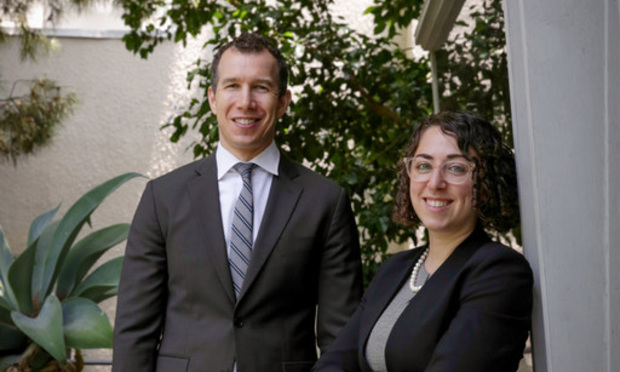Jennifer Katz remembers heading to work that day, but not much else.
She was an associate at Latham & Watkins in Los Angeles, six months into the job on that Friday morning in late February 2009.
 Alexander Chemers, left, and Jennifer Katz, right, both attorneys with Ogletree, Deakins, Nash, Smoak & Stewart, at their home in Los Feliz, California. Photo: Jamie Rector
Alexander Chemers, left, and Jennifer Katz, right, both attorneys with Ogletree, Deakins, Nash, Smoak & Stewart, at their home in Los Feliz, California. Photo: Jamie Rector
Lawyers who graduated during and shortly after the Great Recession were spun sideways by layoffs and deferrals. Many are still trying to get back on track.
June 24, 2019 at 05:30 AM
1 minute read
Jennifer Katz remembers heading to work that day, but not much else.
She was an associate at Latham & Watkins in Los Angeles, six months into the job on that Friday morning in late February 2009.
Join General Counsel and Senior Legal Leaders at the Premier Forum Designed For and by General Counsel from Fortune 1000 Companies
Join General Counsel and Senior Legal Leaders at the Premier Forum Designed For and by General Counsel from Fortune 1000 Companies
Honoring outstanding legal achievements focused at the national level, largely around Big Law and in-house departments.
Truly exceptional Bergen County New Jersey Law Firm is growing and seeks strong plaintiff's personal injury Attorney with 5-7 years plaintif...
Shipman is seeking an associate to join our Labor & Employment practice in our Hartford, New Haven, or Stamford office. Candidates shou...
Evergreen Trading is a media investment firm headquartered in NYC. We help brands achieve their goals by leveraging their unwanted assets to...
MELICK & PORTER, LLP PROMOTES CONNECTICUT PARTNERS HOLLY ROGERS, STEVEN BANKS, and ALEXANDER AHRENS